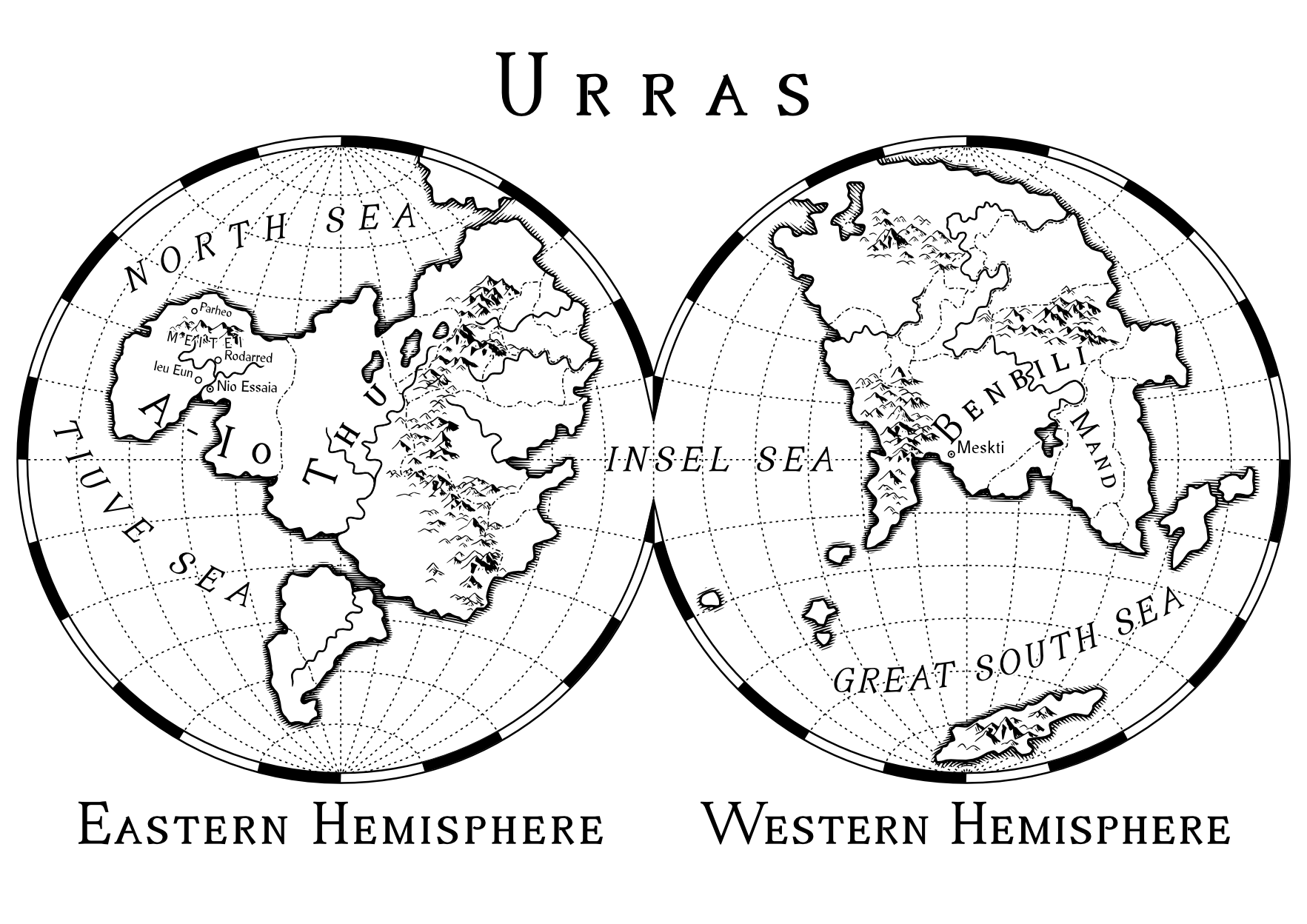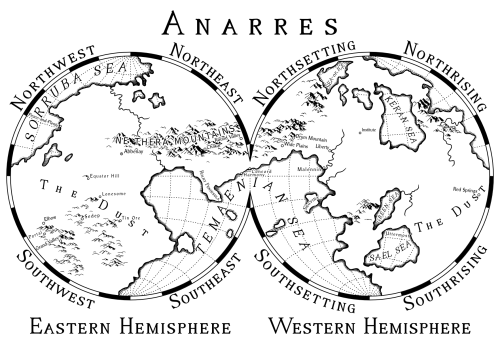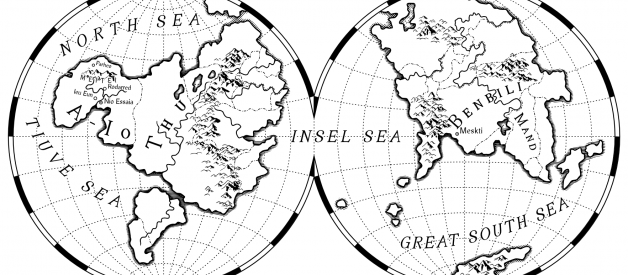Dystopias are the flavour of the week, month, and year. It seems more politically attuned to paint the various landscapes of doom that the current political situation suggests, than to represent a more uplifting state of affairs. Witness Black Mirror, The Handmaiden?s Tale, the boom of discourse about our era being ?basically Orwell?s 1984′, and so forth. Don?t get me wrong: I love a good dystopian tale. But dystopian works are not the only speculative fictions relevant to our current climate. We also need to pay attention to texts that disrupt our status quo not by exacerbating its weaknesses, but by forcing us to consider what might replace it. The how is, of course, a third important question ? what forms of resistance could possibly lead a significant change in the current economic and political system, short of climate disaster? Although crucial, neither discussing forms of resistance nor dystopian critique are enough.
The critique carried out by dystopias is necessary, but it is not sufficient. Lacking a proposal, critique is only partial nourishment; it becomes the speculative equivalent of having a falafel wrap without hummus. Sure, a falafel wrap is great, but wouldn?t it be so much nicer with some hummus as well? And also, because hummus and falafel are both made out of chickpeas this metaphor emphasises the connected nature of utopia and dystopia. But enough of stretching an already dubious metaphor. What I want to discuss is the value of one particular utopia: Ursula K. Le Guin?s 1974 novel, The Dispossessed (usefully available to read online here). It asks questions that anyone who desires to change the status quo should ask themselves about what they think should replace it. Equally important, it should provoke some concerns even in those who think that, actually, the doomsayers are exaggerating and things are more or less fine as they are. In that sense, my reasons aren?t aimed only at the revolutionaries and pessimists reading this, but also to the the reformists and the optimists who might be.
Note, if you have not read the novel: I will try to make the following discussion relatively ?spoiler-free? ? but inevitably I will refer to quotes and events in the source material. Anyways, what matters is how the characters get where they?re going, not what exactly happens. It is my hope that these references will do two things: 1. Spark a desire to understand their context, and so read the entire book, and 2. Enhance your enjoyment of the book when you do read it, as you discover how these elements, encountered in their proper context, are even more engrossing and nuanced than this piece could possibly describe.
For capitalists and reformists
The Dispossessed tells the story of Shevek, a physicist from the anarchist society of Anarres who returns to Urras, the planet from where his ancestors departed about 200 years ago, in order to ?unbuild walls? (8) that have kept the twin planets apart both in ideological and practical terms, with only sparse and slow communication between them. He land in A-Io, which seems to be the most successful, free-market capitalist nation on Urras. He is shocked at the rich but unequal society he encounters after being raised in the poor but egalitarian world of Anarres. If only those two societies existed, the novel could be said to set up a simplistic dichotomy that assumes the a priori superiority of the socialist-inspired society. However, this is not the case. From the maps which open the printed edition, Le Guin lets us know that other nations exist on Urras even if they are not the setting or focus of the narrative. One of these is Thu, which is recognisably a calque of the USSR, with its origins in idealistic class struggle and later devolvement into state socialism, with censorship and totalitarian control over the masses concealed under the thin guise of socialism.
 Image Andreas Skyman CC:BY-NC-SA 4.0
Image Andreas Skyman CC:BY-NC-SA 4.0
The inclusion of Thu as part of the backdrop of the story, and the role within the narrative of a Thuvian academic, Chifoilisk, shows that Le Guin is aware of the risks of revolution. In one conversation, Chifoilisk tries to explain to Shevek that he is being exploited by his hosts in A-Io, and invites him to Thu ? after all, he says, they are both ?products of the same great revolutionary movement? (136). To this, Shevek points out that their state is even more powerful than A-Io, and that the government of Thu fears Anarres because ?we might bring back the revolution, the old one, the real one, the revolution for justice which you began and then stopped halfway? (138). Despite his scathing reply, Chifoilisk insists a bit more on the invitation, in apparent earnestness, and does offer Shevek some sound advice about thinking in terms of social movements and not just individuals the way he is accustomed to doing.
Throughout the exchanges between Shevek and Chifoilisk, Le Guin shows that her work is not blindly endorsing any system that touts itself as anti-capitalist and revolutionary; neither is she looking down on all followers of a centralised socialist society such as Thu, as Chifoilisk does appear to be acting out of strong and earnest convictions. Nonetheless, because the story is told through Shevek?s perspective the reader does get a strong sense of the inadequacy of the Thuvian system and its negative dimensions such as state-controlled press and propaganda. The nuances of Le Guin?s critique in this respect can be appreciated even by those who do not have an anarchist or even generally leftist political vision. Later in the novel, A-Io and Thu are engaged in a proxy war over the ?third world? country of Benbili. As an Urrasti friend explains to Shevek, the question of who governs Benbili is actually irrelevant and ?the politics of reality concerned the power struggle between A-Io and Thu? (p. 203). The Cold War parallel is evident, which shows how attuned the novel is to the risks of radical politics, how far it is from naive endorsement of any ol? leftist government that speaks of revolution.
The representation of Thu shows that Le Guin has considered arguments that oppose Leftist politics based on the abuses of the real socialisms of the twentieth century, but her capacity for showcasing novel perspectives is just as important as the way she incorporates existing controversies in her fictional worlds. The Dispossessed has the effect of giving you new perspectives on things usually taken for granted, such as the physical spaces of consumerism. When he visits Saemtenevia Prospect to buy clothes, Shevek is both intimidated and unsettled: he has never encountered a commercial street. He calls the two-mile-long retail street the ?nightmare street? (132), and vows never to return. His reaction is not mere rejection of the unknown, although that probably does play a role. He has a compelling reason for his judgement: nothing is actually manufactured there, it is all mere packaging ? where only exchange value matters, in Marxian terms. Shevek?s reflection is an eloquent summary of the problem with Saemtenevia Prospect: ?All the people in all the shops were either buyers or sellers. They had no relation to the things but that of possession? (132) Shevek?s reaction is thus a concrete illustration of the alienation that takes place under capitalism.
In its very concreteness, Shevek?s reactions to market capitalism as someone completely unfamiliar with its mechanisms could make its advocates think about the system in ways they had not done so before. Shevek?s reaction helps us see that there is something ?nightmareish? about the consumerism that both derives from and reinforces capitalism. Consider, for example, the commonplace notion that free market capitalism is better than other economic systems because it allocates resources in the most efficient way and therefore maximises productivity. If we defend capitalism for its productivity, shouldn?t we recognise the inefficiency of having vast swathes of land such as the ?nightmare street? dedicated only to exchange, to an activity that in itself produces nothing and does nothing to improve human situations? Of course, market-type spaces of exchange are necessary, but Anarres has addressed that issue in a way that manages to distribute goods in an effective, decentralised way without the need for either currency or a massive commercial avenue in every city and town. Goods depositories and workshops where individuals take the goods they are allocated or need are described on Anarres, and they would seem to be sufficient solutions in a society where material desires as well as resources are sparser, and organisation is decentralised into small communities. This is only one example where the realistically drawn society of Anarres, and its contrasts with Urras, might make even die-hard defenders of capitalism go ?Oh, I hadn?t thought about that ? it?s a good point?.
For revolutionaries and inconformists
With the rise of AI and automation, it has become increasingly easy to picture a future of leisure where robots do most of the hard work and humans are free to? well, be human: engage in leisure activities, socialise, and generally enjoy life. Even in currents of Leftist thought, this easy-going post-revolutionary state is imaginable and has become increasingly common as ideas such as Universal Basic Income start to appear feasible. Although this world of robot-facilitated leisure is certainly a possibility, climate and resource pressures as well as the general uncertainty about the future should make us wary of it.
Le Guin?s depiction of Anarres as a society were people are mostly free to do things and use their initiative, but not free from material scarcity and the need to engage in often strenuous physical labor, serves as a reminder that the day after the revolution is unlikely to be a holiday. Her recognition of the hardships of constructing a society based on completely different foundations, the many challenges associated with trying to achieve things without centralised commands or laws, runs throughout the whole work and justifies its original subtitle, ?an ambiguous utopia?. Among other functions such as providing a nuanced psychological background for Shevek?s personality, the retrospective chapters that narrate events before Shevek?s trip from Anarres to Urras fulfil the important function of making this ambiguity tangible, the sheer difficulty of living in the revolution. For example, Shevek and his wife are separated for four years because of incompatible ?voluntary? work postings during a great drought (which thanks to social pressure they don?t consider refusing), and Shevek undergoes excruciating famine and wearying work conditions that whole time.
In depicting Shevek?s less-than-blissful experiences under anarchism, Le Guin is showing that his life is characterised by material scarcity and demanding labour as much as by political freedom. Even if made possible by some technological and cultural developments of capitalism itself, transcending it and moving into something like Anarres?s system of cooperative anarchist economics would likely create the need to lead a completely different life than the one that can be led under capitalism. As Le Guin writes of Anarres, any post-capitalist system on Earth would likely be made possible and take much of its value system from existing technologies and cultural forms ? not acknowledging this would be a form of regress that at least those on Anarres were not willing to take:
They knew that their anarchism was the product of a very high civilization, of a complex diversified culture, of a stable economy and a highly industrialized technology that could maintain high production and rapid transportation of goods (95)
At a psychological level, too, Le Guin generates occasion for readers to question what they are being shown of Anarres. A somewhat ignorant (because that was the condition of women in A-Io) yet perceptive character points this out in discussion with Shevek:
I think you Odonians missed the whole point. You threw out the priests and judges and divorce laws and all that, but you kept the real trouble behind them. You just stuck it inside, into your consciences. But it?s still there! You?re just as much slaves as ever! You aren?t really free. (219)
There are several levels of questioning here. Firstly, should morality be an external, social imposition, or an internal force, as Shevek implies when he responds to her objections? Second, Vea queries whether such an internal moral order, often more rigid than any order externally imposed, actually increases the freedom to determine one?s actions, or actually increases psychological subjection. As she says of a tyrannical Urrasti queen: ?Better to have her in a palace. Then you could rebel against her. You would have!? (219). Their conversation is cut short by the arrival of the other guests to Vea?s party, so we don?t get to know what Shevek would have replied to her final comment about desiring to be free.
The final level of analysis, however, would ask if total freedom is even attainable. Whether following internally chosen or externally imposed norms, it seems humans cannot really do without some form of regulation. Le Guin?s emphasis on responsibility and promising suggests that the ideal situation is one where rules are decided in an act of freedom, where one chooses to become bound by them, and therefore the consequent diminishing of superficial freedom enlarges autonomy in a deeper sense. All of this, of course, negates the idea that revolution can be done from the top-down, imposed in any way on a population. As Shevek pronounces in an epic, if ineffectual, speech:
You cannot take what you have not given, and you must give yourself. You cannot buy the Revolution. You cannot make the Revolution. You can only be the Revolution. It is in your spirit, or it is nowhere. (301)
This is not to say that Le Guin ignores the social realities that come up against individual, often naive, attempts to ?be the Revolution? ? and the need for organisations capable of enacting change at a social level. The tragic climax of the scene where Shevek gives the speech quoted above is, in fact, a vivid illustration that individual consciousness is by no means sufficient to change the world, even if it necessary.
Additionally, Le Guin expounds the risk of stagnation after the revolution: The PDC that organises distribution of resources and voluntary work placements on Anarres is slowly ossifying into a bureaucracy, and dissent is increasingly being put down by means of social pressure and limits on communication channels by the syndicates in charge of them. As Shevek says to his wife in a crucial conversation that sets his trip to Urras in motion:
[T]he social conscience completely dominates the individual conscience, instead of striking a balance with it. We don?t cooperate- we obey. We fear being outcast, being called lazy, dysfunctional egoizing. We fear our neighbor?s opinion more than we respect our own freedom of choice. [?] We?ve made laws, laws of conventional behavior, built walls all around ourselves, and we can?t see them, because they?re part of our thinking! (330?331)
Shevek does not know how to avoid the stagnation he and his friends have detected, aside from reconnecting with Anarres?s past by reconnecting with their original home planet?s societies. What is clear, however, is that the solution has to be found in the link between time, utopia, and revolution: this theme comes up repeatedly across the novel, even in its structure that alternates chapters set before Shevek?s trip to Urras with his visit. Through the novel?s treatment of different conceptions of time, as well as its looping structure, Le Guin suggest the idea that revolution is a circle that never fully closes (recalling the original etymology of the term, too). Building a better society, even when it seems to be achieved, is a process necessarily inscribed in time, both the linear time of historicity and human action, and the cyclical time of seasons or eternity, where the future always contains the past. Thus, Le Guin?s treatment of time provides a way to avoid the accusation of stasis that plagues utopia, because Anarres is not a place where history has come to an end. Rather, there is a need for society to keep progressing and changing, each individual constantly enacting the revolution, if always with reference to an initial ideal.
 Image Andreas Skyman CC:BY-NC-SA 4.0
Image Andreas Skyman CC:BY-NC-SA 4.0
For the apolitical
Even if you?re not that keen on debating anarchism as a viable form of social organisation, I think The Dispossessed can still have its charms. Although it?s frequently said that in science fiction the style does not matter nearly as much as the ideas developed, I think that dismissing or ignoring this novel?s aesthetic value would be wrong. Le Guin has created a self-contained universe which is much more than a didactic vehicle for political debate; it can be enjoyed even beyond such a debate.
The novel is set in a fascinating self-contained universe. When Le Guin provides glimpses into the wider worlds, beyond the primary characters, she deftly and enjoyably immerses the reader in the world depicted. So, for example, Shevek?s conversation while hitching a ride with a truck-driver highlights the brutality of life in the desert areas of Anarres, the human warmth that makes existence there possible, and de-centres the narrative momentarily to this very secondary character whom we will never encounter again. Through his story, we get first a sense of many lives being lived on Anarres, of a real world with innumerable little triumphs and defeats rather than an allegorical construction merely there to transmit philosophical ideas: ?And it?s steady, I like routine; you can think. Fifteen days on the run, fifteen off with the partner in New Hope. Year in, year out; drought, famine, whatever.? (310)
As the conversation progresses, the subject matter gets bleaker. They discuss the last few years of drought, the tough decisions individuals have had to make as a result. Shevek is referred to as ?the passenger? throughout this scene rather than by his proper name, as if to show that he is not, for now, the focus of the story. Instead, the focus is on the dialogue of this ostensible everyman, his life and reflections on morality. The scene is brief and Shevek?s movement from one point to another could easily have been skipped over, but it gives the reader an image of this arid world, both through the people who inhabit it and through descriptions of the otherworldly landscape:
The straight shining rails ran under the wheels. Clouds in the west laid great shivering mirages on the plain, the shadows of dreams of lakes gone dry ten million years ago (311?312)
You don?t need to be an anarcho-syndicalist, I think, to enjoy the elegant prose, captivating conversations, and otherworldly landscapes that Le Guin has created here and elsewhere in the book.
When opening this piece, I mentioned the forms of resistance that could possibly change our own global status quo. Unfortunately, we do not have an inhabitable moon and some space-ferries to carry all the dissidents there and let them figure things out on their own. On our own planet, it is hard to see how an anarchist society like the one on Anarres could come to be in the near-future. Also, as I have mentioned, Anarres itself is not even presented as an ideal society ? it has several flaws, growing imperfections, and might not even be considered an anarchist system by the strictest definition of the term. So, what is an ambiguous utopia good for, faced with the seemingly-unmoveable realities of Earth? Precisely because it makes reality seem moveable, a utopia can be a starting point for earnest debate about the things all of us, from the most revolutionary to the most politically indifferent, often take for granted. It might not seem like much, but I think that any political action not inspired by an ideal of society, and not just a negative desire to overturn what is already there, is even less likely to succeed.
Edition referenced: Le Guin, Ursula K., The Dispossessed, Harper Perennial Modern Classics (New York: Harper Perennial, 2014) [This edition has a lot of annoying typos such as describing young Shevek as an ?eighty-year old? so I would actually avoid it if you?re looking to get a physical copy]


